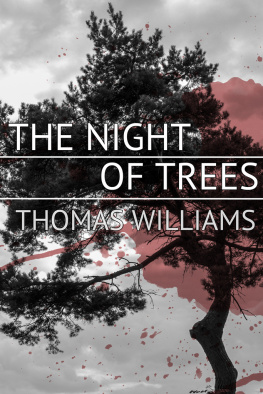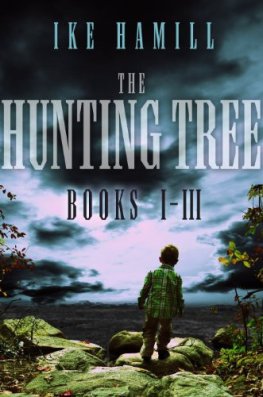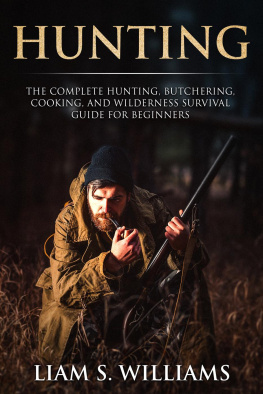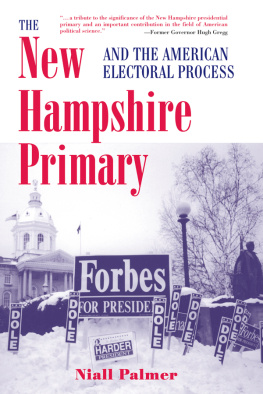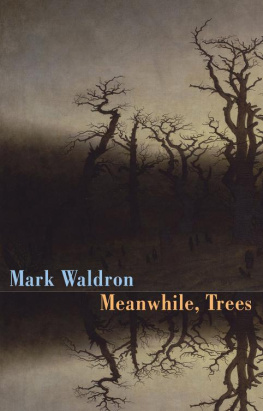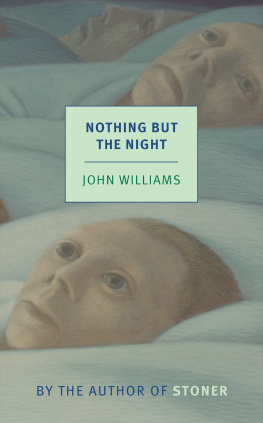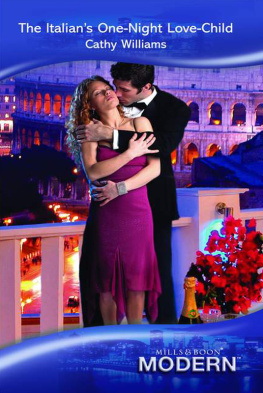Williams - The Night of Trees
Here you can read online Williams - The Night of Trees full text of the book (entire story) in english for free. Download pdf and epub, get meaning, cover and reviews about this ebook. year: 2013;2015, publisher: Dzanc Books, genre: Art. Description of the work, (preface) as well as reviews are available. Best literature library LitArk.com created for fans of good reading and offers a wide selection of genres:
Romance novel
Science fiction
Adventure
Detective
Science
History
Home and family
Prose
Art
Politics
Computer
Non-fiction
Religion
Business
Children
Humor
Choose a favorite category and find really read worthwhile books. Enjoy immersion in the world of imagination, feel the emotions of the characters or learn something new for yourself, make an fascinating discovery.
- Book:The Night of Trees
- Author:
- Publisher:Dzanc Books
- Genre:
- Year:2013;2015
- Rating:3 / 5
- Favourites:Add to favourites
- Your mark:
- 60
- 1
- 2
- 3
- 4
- 5
The Night of Trees: summary, description and annotation
We offer to read an annotation, description, summary or preface (depends on what the author of the book "The Night of Trees" wrote himself). If you haven't found the necessary information about the book — write in the comments, we will try to find it.
A New York businessman (whose wife has just left him) and his estranged son come to New Hampshire for a hunting trip.
The Night of Trees — read online for free the complete book (whole text) full work
Below is the text of the book, divided by pages. System saving the place of the last page read, allows you to conveniently read the book "The Night of Trees" online for free, without having to search again every time where you left off. Put a bookmark, and you can go to the page where you finished reading at any time.
Font size:
Interval:
Bookmark:
The Night of Trees
Thomas Williams
Dzanc Books
Dzanc Books
1334 Woodbourne Street
Westland, MI 48186
www.dzancbooks.org
Copyright 1961 Thomas Williams
All rights reserved, except for brief quotations in critical articles or reviews. No part of this book may be reproduced in any manner without prior written permission from the publisher.
were first published in Esquire Magazine for May, 1960, in a slightly different form under the title Waiting for the Moon.
A part of was published in Good Housekeeping for October, 1961, under the title Christine.
Published 2013 by Dzanc Books
A Dzanc Books rEprint Series Selection
eBooks ISBN-13: 978-1-938103-20-9
Cover by Awarding Book Covers
The characters and events in this book are fictitious. Any similarity to real persons, living or dead, is coincidental and not intended by the author.
Contents
PART ONE
Why should men love
A wolf more than a lamb or dove?
HENRY VAUGHAN
HE HAD started from New York late in the morning, buzzed along over the wide turnpikes through Connecticut and Massachusetts, and now, on the long hill above Leah, New Hampshire, stopped to put up the top of his new little car. The sun was about to go below the hills, and October began to make itself felt again after a bright day. It was as if October and New Hampshire meant the same bright coldness; the sun went quickly toward the hills, and the horizontal light itself seemed cold against the vivid hills to the west, on which, even though they had lost most of their leaves, the hardwoods stood orange and black, struck out against dark green pine and spruce and hemlock, the green of these dark and yet so bright they amazed the eye, for behind them was a bank of cloud as black as the deepest part of the night. Not a speck of dust softened the air, and each tree a mile away, each bird shaking on the wind was all sharp edge; even the border of the cloud was honed sharp against the blue.
Night came with the shutter of the black cloud, and as he drove down into Leah, into an autumn as precisely right among the old New England houses and the fountaining elms as childhoods pure memory of autumn, huge clean dollops of rain splashed against his windshield and cleaned it of the acid grime that he had, it seemed, been living in all year until now.
He had owned the little car a week, and though they had told him that it was a racing car, not anything like the large sedan he had been used to, and that it might bite him, he didnt worry about that. He was a careful man, careful in the sense of preparation and researchnot in the pursuit of limits. He drove fast, and used the machine according to the specifications of its maker. He had no desire to race: the little car was a present to himself of honesty and predictability, a reward, in a way, for prolonged confusion and unhappiness. His wife had left him. His son had quit school and was about to be drafted into the army.
But he was not a man enmeshed in lies, a man who considered himself betrayed. Rachel, his wife, to the best of his perceptions, had not lied herself away from him. If he yearned for honesty, it was more an understandable simplicity, perhaps, than honesty, that he wanted in her and in his son, Murray. He was not, and he knew he was not, a simple man. He had always been able to cope, able to see the complexities of life in such a way that they became, if not simple, at least understandable. He was a man capable of making up his mind.
And so he had given himself presentsthe Arnolt-Bristol roadster, a new rifle from Abercrombie & Fitch, a new wrist watchall expensive. There was no reason why he shouldnt. He had never collected things, had few of the intense and fashionable hobbies of the well offno hi-fi, no sailboats, no horses, no other highly intricate sporting equipment. He had worked hard; he was forty-five years old, and his business, in which he was an equal partner with his father-in-law, seemed just now to run itself with an almost human instinct for gain. It consisted of ten dry-cleaning plants, two in each of the five boroughs of New York City, where the fallout of industrial soot was constant and profitable.
Now, in the sudden night, he drove toward the quiet center of Leah, the cockpit of the buzzing car functional, plain, yet illuminated by the glowing faces of the dials that were at the same time sensuous, warm, without the slightest lack of honesty and precision, telling him of his control, of the machines faithfulness. Foolish, he knew, to depend upon a machineand yet, why not? Machines could not love you, it was true; but how rare was honesty, cold but absolute; if the machine stopped, you opened it up and looked inside, and there was the simple trouble.
He had two weeks in which to hunt and, he hoped, to try to understand his son. Murray was still at Dartmouth, and hadnt yet said definitely whether he would come to the lodge or not. But if he would, perhaps the things they had in common might lead to a solution of other problems. Richard had always tried first to simplify, then to include the necessary complications. He could not dive into the emotions, tears and loving gestures scattered God knew where. He was an effective man; a good shot, for instance, and he was a good shot because he took careful aim. He would plan and wait and see.
They knew he was coming at the lodgeShim Buzzell and Shims father, Zachbut he stopped at the Welkum Diner to call and make sure. Shim answered right away and said come on up, and Richard decided to have a cup of coffee while three boys in black motorcycle jackets went out to look at his car, then came back in to look at him, their faces hard and full either of respect or of possible mayhem. He couldnt tell, but drank his coffee and let them look. Either a hero driver or a fancy pants, he thought; he looked young for his years, and rather dignified in a large, lean, yet somewhat overclean way, like one of the models in magazines who tried to make long cigars seem highly respectable in their tapered, immaculate fingers. Like most healthily vain men, he knew what he looked like, and how he looked was odd in Leah, New Hampshire. A handsome man with a black mustache (his fathers, worn as a memento, a bit of continuity; it was identical to the one in the old albums), and above the black mustache his bony British Grimald nose; above the high cheekbones pale, cold eyes of the color of robins eggs. He never had to speak in order to be highly noticeableeven, sometimes, he felt, a little frightening.
The juveniles waited until he was through with his coffee, and casually followed him out. He was sure they liked the sound, and he enjoyed, with a certain amount of embarrassment at his own childishness, his fairly expert speed shift into second gear. The motor could seem nicely angry if one played with it. The juveniles, with delinquent tendencies now, leaped to their motorcycles, fol lowed him for a few miles until he turned off the tar onto the gravel, and then turned back.
In New York he had been conscious of the murky airpart irritation, part his businessbut there was no such falloutat least no visible fallouton this New Hampshire mountain. His headlights shone on the dark spruce and turned them from black shadows into clean, lush green. The last few pretty leaves of late Octobers hardwoods, the leafy hummocks beneath the trees, jumped into light; sometimes little eyes, deep in under, stared him by. The wind blew; a sudden curtain of rain fell, and stopped completely, as if it had been tossed from a bucket. In front of him the little dials signified the temper of the machine as it sped upward on the mountain road, and told him that all was well. All was well, and the toy comforted him the way a toy might comfort a child who faced the coming of inevitable grief: a child lived in present time, and could not conceive of the end of any time longer than moments. He could, of course, knowing how short a time forty-five years had been. Yet it worked, this present to himself, and it did take just the sharpest edge away.
Next pageFont size:
Interval:
Bookmark:
Similar books «The Night of Trees»
Look at similar books to The Night of Trees. We have selected literature similar in name and meaning in the hope of providing readers with more options to find new, interesting, not yet read works.
Discussion, reviews of the book The Night of Trees and just readers' own opinions. Leave your comments, write what you think about the work, its meaning or the main characters. Specify what exactly you liked and what you didn't like, and why you think so.

